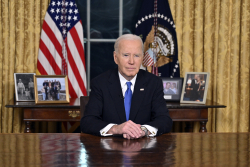By complicating Indian efforts to escalate, while offering a path to peace, Ankara effectively used the war to enhance its own status in the post-American world order.
The India-Pakistan ceasefire on Saturday appears to have narrowly averted a serious test of Pakistan’s naval defenses. The British publication The Telegraph reported then that India had deployed warships armed with cruise missiles in response to the unexpected developments in the escalating India-Pakistan war.
The logic behind such a strike was clear. India wanted to send a message to Pakistan that their recent shootdowns of Indian warplanes, missiles, and drones was a fluke. An Indian naval group—including an aircraft carrier, destroyers, frigates, and anti-submarine (ASW) warships—was positioned roughly 300 miles off Pakistan’s coast. Some of the warships in question are carrying the BrahMos missile, a Russian and Indian-developed missile that can hit 500 miles away at Mach 3. Many are speculating that the intended target was Karachi, Pakistan’s largest city and its economic capital.
An Attack on Karachi Would Shut Down Pakistan’s Economy
If the Indians successfully struck this city with the BrahMos missiles from their naval strike group, Pakistan’s economy would be eviscerated. Karachi is responsible for 76 percent of Pakistan’s trade. Their economy is already struggling. If India had been successful in striking Karachi, the Pakistani economy would be in freefall.
By positioning a strike group to target the lifeline of Pakistan’s struggling economy, New Delhi sent an unmistakable message to Islamabad: de-escalate, or else. It is clear to see why: the success of Pakistani operations defending—and even counterattacking—against Indian attacks had been far more successful than expected.
Of course, had they been left to their own devices, the Indians might have sought to escalate the fight in order to restore the prestige the Pakistanis effectively took from them—and demonstrate that they could win, in order to restore deterrence. There was a domestic rationale for this as well: because of the failure of India’s initial strikes into Pakistan, many Indians are protesting against the wartime decisions of Prime Minister Narendra Modi. Modi, in turn, needed to demonstrate his competency and the competency of his military leaders to stop Pakistan.
Islamabad, on the other hand, was by most accounts surprised by its own success—and was just trying to hang on. And thus far, they have done that. Chinese missile technology was essential to its air defense. And had the war gone on, Islamabad might have even called upon Turkey to assist them in stopping the Indian plan from the sea.
Turkey Might Have Intervened in the War
Turkey has openly sided with Pakistan in the India-Pakistan conflict, Ankara allowed the Pakistani military to access their satellites for military operations against India. What’s more, they now have an ASW warship in Pakistani waters. There is ample evidence that the drones Pakistan has launched at India in retaliation for their opening of hostilities were mostly Turkish drones.
The Turkish ASW corvette, TCG BÜYÜKADA, is presently docked in the Karachi port—the same city that many analysts believe the Indian naval task force was going to strike. The fact that a Turkish warship was present in Karachi’s port—an obviously lucrative target to India’s task force—necessarily would have complicated any Indian plan to strike the city. Indeed, this was probably the reason that the warship was deployed there: it served as an impromptu deterrent to military action.
While Turkey plied the Pakistanis with military assistance, it also called for an offramp to the conflict. Of course, Ankara had much to gain from doing so; by serving as Pakistan’s primary foreign ally (alongside China), it attempted to become the middleman of any possible peace deal to enhance its own national prestige.
Accordingly, at every turn, both Turkey and China were keen to stymie India’s attempts at escalation. At the lower tier of warfare, both Beijing and Ankara knew that Islamabad had the upper hand over India. If, on the other hand, the Indians could scale up their attacks against Pakistan by climbing the escalation ladder, India’s inherent strengths would be impossible to ignore.
So, by complicating Indian efforts to escalate, while offering a path to peace, countries like Turkey effectively used the war to enhance their own status in the post-American world order. So far—if the ceasefire holds—it appears they will have been successful.
About the Author: Brandon J. Weichert
Brandon J. Weichert, a Senior National Security Editor at The National Interest as well as a contributor at Popular Mechanics, who consults regularly with various government institutions and private organizations on geopolitical issues. Weichert’s writings have appeared in multiple publications, including the Washington Times, National Review, The American Spectator, MSN, the Asia Times, and countless others. His books include Winning Space: How America Remains a Superpower, Biohacked: China’s Race to Control Life, and The Shadow War: Iran’s Quest for Supremacy. His newest book, A Disaster of Our Own Making: How the West Lost Ukraine is available for purchase wherever books are sold. He can be followed via Twitter @WeTheBrandon.
Image: Shutterstock / thomas koch.
















